- Home
- James Axler
Siren Song Page 17
Siren Song Read online
Page 17
“Krysty! What brings you to the medical faculty? Nothing bad, I hope.”
Krysty made as if to check her elbows and her knees. “Nope, no broken bones,” she confirmed with a broad grin. “Actually, I wanted your expertise on something. A little problem I came across at the nursery where I work.”
“Fire away,” Mildred said, taking a seat beside Krysty.
“The kids are normal enough,” Krysty explained. “Nice kids really, full of life. But I noticed a few of the younger ones seem kind of, I don’t know, sleepy a lot of the time.”
“Sleepy how?” Mildred asked, her interest already piqued.
“It’s really the little ones,” Krysty said. “Babies. We take them pretty much from birth, so there are a half dozen babies there under two. I noticed one of them was really out of it a few days ago, just lying there like a solid weight.”
“Was the child breathing?” Mildred asked with concern.
“Oh, yes, I’d have come to you straight away if he wasn’t,” Krysty said. “It was more like he didn’t have any energy, like a rag doll. Then today, there was a girl—cute thing, pretty as a buttercup—and she looked like she’d eaten too much—her belly was all rounded and she was absolutely out of it. I tried rousing her but she was... Well, she was awake but she wasn’t really there, if you know what I mean. Do you think they’re drinking mead?”
“No, it sounds like an infection, maybe,” Mildred mused, “or a virus. Is it spreading, do you know?”
“I haven’t noticed,” Krysty said. “Christine—she’s one of the other assistants there—she said it’s pretty normal, and the kids there go through this from time to time.”
“So she’s seen it before?”
Krysty nodded. “Her and Andrea, another lady who helps out. They seem to think it’s nothing. I just... Children, you know?”
“Yeah,” Mildred said, nodding slowly. “They tug on the heartstrings. Have you spoken to Ricky at all?” Mildred added, reminded tangentially of their youngest companion.
“Not recently,” Krysty admitted. “Is he still here?”
“No, he was at the dance last night,” Mildred said. “Dance! I mean the rally. What do you call that thing?”
“I danced,” Krysty said, blushing fiercely.
“Anyway, your kids...” Mildred said, getting back to the topic at hand. “You want me to come over, take a look-see?”
“How hard do they work you here?” Krysty replied. “If you could come over in the daytime then...”
“Tomorrow morning,” Mildred stated firmly. “I’ll come over during my break and give your kids the once-over. Tell them it’s for their own good.”
“It is!” Krysty reminded her.
“Good, then I won’t be lying!” Mildred said.
“You know how to get there?” Krysty asked. “It’s close to the clustered pines out by the west hedge.”
“Nursery by the hedge. I’ll find it,” Mildred confirmed.
* * *
JAK COULDN’T EXPRESS in words what it was that he was feeling, but then words had never really been his strong suit. He only knew that he wanted to be with Charm, and that she treated him really nice. The previous night she had spoken about a future together, about them setting up their own ville where she would be the baron.
No, not baron—Regina.
He wanted to be with her. The way she swung her hips when she danced, the way they made love with fury and strength until his muscles burned. He wanted it to last forever.
His need to be close to her had driven him that day, and he had cleared a great square of field—enough work for two men over two days and he had done it in one. But he was wasted there, he knew, clearing fields and chopping firewood from what was left. He wanted Charm to be proud of him, the way she admired his body, his strength. He wanted to use his old skills, hunting skills, chilling skills—the things that Jak Lauren had brought to Ryan’s group.
After his shift was over in the field, with his muscles aching from all that he had put them through, Jak stomped into town like a hurricane, making a dead-eye path to the Regina’s towering residence in the very center of Heaven Falls.
Words had never come easy to Jak, but he somehow managed to make it clear that he was there to see the Regina and he wouldn’t take no for an answer. The Melissa on the door, a sweet-faced brunette called Dorothy, told him to wait on one of the benches outside, where he caught the last of the sun’s dwindling rays and listened to the insects buzz and the birds sing. There was green in the skies today, where toxins floated around in wispy clouds that barely had any substance to them, like a sheet of gauze cast over the air. It was fallout from the nukecaust, that terrible day that had changed the world and never seemed to come to an end.
Dorothy came back and accompanied Jak into the Regina’s residence. He kept pace with her as she led him up through the tower and into a high room whose windows looked out in all directions, taking in the fields and the houses and the mountains. If he looked really hard, Jak thought he could even see the redoubt where they had arrived a week earlier, just a little mound in the grass, hidden among the trees.
The Regina reclined on a low-backed chair that was more like a bench, picking at dried berries glazed in honey. Her hair was up in an elaborate design that dropped in front of her like the horn of a unicorn, and she wore a yellow dress made up of gossamer-thin layers that seemed to cling to her svelte body like liquid. Her eyes and mouth were striped black with makeup, cast there in thick lines like a painting that was smudged before it could dry.
“You asked to see me?” the Regina stated, phrasing it like a question, though it wasn’t.
Jak nodded. “Want help you,” he explained. “Am hunter. Am chiller. Could do that. Could protect ville. Feed ville.”
“You want to protect the Home?” the Regina asked, raising one perfectly manicured eyebrow.
“Good at it,” Jak said. “Could do sec for ville. Chilled bear,” he added in afterthought, as though that fact might help him gain her trust.
“The Melissas guard the Home,” the Regina explained emotionlessly. “They guard me.”
“Could do that,” Jak insisted. “Could guard you.”
“You want to be a Melissa?” the Regina asked. She was clearly taken aback.
Jak nodded. “Yes. Melissa. Sec man. Same.”
The Regina shook her head sadly, chewing on the nub of a berry. “Only women may perform the sacred duties of the Melissas. Only they may eat the royal jelly. No men allowed.”
Jak watched her, unsure what else he could say. “I can guard,” he said finally.
“Women only,” the Regina repeated. “Order has built this place, and order keeps it safe and assures its growth. Heaven Falls stands in tribute to what can be achieved by following a structure without deviation. To have a man perform the role of a Melissa would be deviation, and that can simply never be.”
Jak nodded his understanding, his eyes downcast. “Sorry. Didn’t know.”
“You were brave,” the Regina said, “to come to me the way you have. Someone must have seen this in you.”
Jak nodded. Charm had seen it. He just wished he had a way to prove to her how fearless he could be.
And then the Regina said something that surprised Jak, for it was almost as if she had read his thoughts. “She already knows, your woman. She sees the greatness in you and she fosters it, which is what brought you to me. Trust her. Obey her. Let her be your guide. And one day, you shall fly free and prosper in the world beyond, illuminating the darkness, spreading the spirit of the Trai.”
Jak left, having failed in his petition to become a sec man. But he left feeling satisfied, as if something had been showed to him that had been obscured. The future was stretched wide-open in front of him, and he would grab it with Charm. Together the
y would bring greatness and new brilliance to the lands outside these walls.
Chapter Twenty-One
Ricky had come to live with J.B. and Mildred and he had taken the spare room. J.B. didn’t mind. The kid was no bother and he figured he might have an ally in all this strangeness while everyone else around him was slowly withdrawing into themselves.
He was wrong.
He had pressed Ricky about a few things over their first couple meals together—breakfast and a subsequent dinner—and Ricky seemed happy, really happy. That was how it was with them now, J.B. realized. As if they’d all caught some happiness bug that left Ryan and the others grinning from ear to ear as they went about their workaday lives, digging latrines and building storage shacks for beans or whatever the hell it was they had all been assigned to do.
Ricky got an assignment, too, after a couple days cooling his heels at the shack. The medical woman called Petra had discussed Ricky’s health with Mildred. Then Phyllida, the leader of the Melissas who seemed to perform some kind of more general leadership role within the Heaven Falls hierarchy, had come over and told Ricky he’d be picking apples in the fields to the west for the next couple weeks. It was light duty, but necessary, and there was plenty of work to go around. Sometimes it seemed to J.B. that these Trai folks were feeding up an army with all the stuff they grew and preserved and glazed and pickled.
Ricky took to the work well, fitting in nicely with the mountain community. He didn’t bother J.B.; if anything he bothered him a lot less than he had on their days on the road together, which made the Armorer all the more suspicious.
A disease called happiness, infecting everyone it touches. That was how J.B. viewed it, and he was determined not to get sucked in.
While the others drank the sweet alcohol to stave off the chill mountain air, J.B. kept a clear head and drank only water—a lot of it sourced straight from a little mountain stream he had located out to the east, nothing more than a foot-wide trickle passing over the rocks before slipping back under the ground. He boiled the water and stored it, sipping from a metal hip flask he’d carried around with him before they’d settled here in the mountains with the Trai.
Food was plentiful, but J.B. ate sparingly. He worked outside, and they worked him hard, but he didn’t want his body to go to fat, and the food here was universally sweeter than he preferred. While the others enjoyed another all-you-could-eat feast in the center of town, with dancing and games, J.B. endured it solemnly from the fringes of the crowd, picking at his food without relish, watching his friends as if they had become strangers, aware that they probably had.
If Mildred noticed a change in J.B., she said nothing. But J.B. wouldn’t have been surprised to learn she had noticed nothing, so wrapped up was she in her own work, the herculean task of cataloging and memorizing the thousand-and-one different medicines and potions that the Trai had created and refined from their little selection of ingredients, the herbs they grew mixed with the nutraceutical benefits of the honey.
Mildred seemed dazzled by the whole setup to J.B.’s eyes, and he couldn’t talk with her without her slipping into “shop talk” about this or that remedy, this or that discovery or revelation or healing miracle. The farmhand called Paul, the one whose face had almost gotten torn off by a mutie bear, recovered quickly, and Mildred assured J.B. that the man showed no signs of scarring or pain.
“I’ll bet he’s real broke up inside,” J.B. muttered, thinking about how it had to feel to have your face torn off by a wild animal.
Mildred shook her head. “It’s like it never happened,” she told him. “The man’s a walking, talking miracle.”
She didn’t mean the man, of course; she meant the medicine that the Trai had applied to heal his wounds. That was the miracle, and it was one that Mildred spoke of taking out into the world, bringing healing to the masses.
J.B. didn’t understand how Mildred felt. He couldn’t. She had grown up in the twentieth century, that great age of medicine where every problem had a solution, every disease a cure. It had led to a place where men set off nuclear bombs to make their points heard, because not enough of them were dying by the old, natural ways. J.B. wondered whether that was really what Mildred wanted to return to.
* * *
ON THE NINTH day, J.B. returned home to a visitor. The Armorer had spent the past three days sawing and whittling wood to build a grain store. It was a big project, but he had been left largely undisturbed, which suited his temperament well. When he returned home, his shoulders ached and his hands felt raw from lugging rough wood around all day.
J.B. sensed the presence before he even opened the door. The door was unlatched—there were no locks in Heaven Falls, but J.B.’s honed instincts kicked in automatically when someone had visited, spotting the telltale signs that the door handle had moved, a boot had scuffed the stoop.
J.B.’s body went to its default mode, and he moved in a crouch, hunching in on himself and reaching into his jacket for the chisel he’d brought home from the construction site. It was a feeble weapon, but it was all the Armorer had now—that and his fists.
Warily, J.B. pushed open the door at fingertip length and stepped back onto the porch. “Who’s there?” he demanded.
“Just an old, old friend,” Doc replied from inside, his voice as rich and sonorous as ever.
J.B. smiled, slipping the chisel away and stepping into the main room of the shack. He saw Doc sitting by the smoldering fire, his legs up on a low table that J.B. had constructed in his free time.
“What’s the news?” J.B. asked, closing the door gently behind him.
“You have a date,” Doc began, “in two days’ time. A walk-around of the beehives with me and my team. That is, if you are still interested.”
J.B. looked at Doc eagerly. “Outside the gates?” he asked.
Doc nodded. “Yes, we will be looking at the external beehives in the morning, just as you had requested.”
J.B. leaned down and grasped Doc’s hand. “That’s perfect, Doc, perfect. I’ll be there, wherever you need me. Two days’ time, you said?”
Doc nodded. “My place, first thing. We leave about an hour after sunrise.”
“I’ll be there at dawn,” J.B. assured him.
Now all he needed to do was to okay it with his foreman, but he figured that wouldn’t be such a difficult ask. His foreman—actually a woman called Helena—was kind of a taskmaster, but she encouraged J.B. to try his hand at new stuff and he figured she wouldn’t resent him looking into what other occupations were available here to the Trai. He was a newcomer; he could be expected to have itchy feet.
* * *
MILDRED VISITED THE kindergarten on the eighth day and again on the afternoon of the ninth. She wanted to get a clear idea of what was affecting the babies—and something certainly was. While she hoped it wasn’t anything too serious, monitoring it over a couple days helped her gain a better idea of the deterioration concern.
The kids were lethargic, just as Krysty had outlined, and they seemed kind of vacant, and couldn’t pay attention when she spoke to them. Mildred tried shining the light of a candle with a mirror at the babies in their cribs, but they didn’t flinch or show any interest. Mildred suspected that maybe their eye muscles weren’t responding the way that they should, part of the lethargy that seemed to have gripped them.
On the afternoon of the second day, Mildred pulled Krysty aside and set out her conclusions over a glass of sweetened water while the older kids played in the enclosed yard.
“I think it’s infant botulism,” Mildred began, concern on her features.
“Is it serious?” Krysty asked.
“It can be,” Mildred confirmed. “Untreated it can lead to paralysis and if that goes to the chest muscles, then a patient can stop breathing.”
“That is serious,” Krysty agreed. “Whe
re did it come from? Is it catching?”
“No. Botulism is an infection of the digestive tract—the gut,” Mildred explained. “It’s not contagious. It’s caused by impurities getting in during food preparation.”
“But it causes paralysis?” Krysty asked.
“Yeah,” Mildred said, looking out at the children playing in the yard. “Kids can be more susceptible to it. Infant botulism has its own category in the medical journals.”
Krysty looked at Mildred as if the woman were speaking gibberish.
“Old books of diseases,” Mildred clarified. “We used to use them before the nukecaust.”
“You remember this stuff?”
“A lot of it comes back when you’re faced with symptoms,” Mildred admitted. “Triggers that old knowledge I didn’t remember having from when I was training. You read about a lot of diseases when you’re training to be a doctor.”
“Where would such a thing start?” Krysty asked, pitching her voice at a low whisper. “And if it’s not contagious, why are several children affected? From what the others here have indicated, it seems that they’ve come into contact with this before. Children have died. It’s not unusual.”
“The infection’s bacterial,” Mildred said, “and it generally comes from food getting into the gut and festering the way it does. There are a lot of bacteria out there, swimming around in the air these days. This...outbreak, if you want to call it that, could have come down in a rain shower for all we know.”
Krysty looked pensive. “You always told me that most of being a doctor was looking for the obvious. Rain showers aren’t obvious.”
“Did I say that?” Mildred asked.
Krysty nodded. “Once or twice. So if not a rain shower, how else?”
“The world got messed up six ways to Sunday when they dropped the bombs, Krysty,” Mildred noted. “We shouldn’t discount that.”
“But the adults are fine,” Krysty reminded her.
“Adults are stronger,” Mildred said. “They build up immunities. Resistances. Unless...”

 End Program
End Program Nemesis
Nemesis Terminal White
Terminal White Homeward Bound d-5
Homeward Bound d-5 Blood Harvest (v5)
Blood Harvest (v5)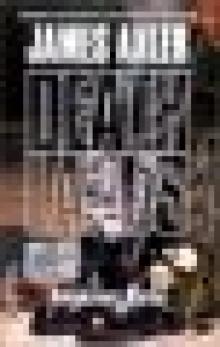 Amazon Gate
Amazon Gate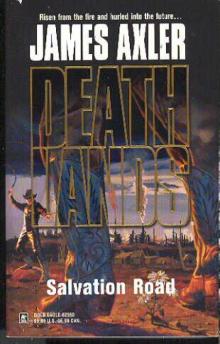 Salvation Road
Salvation Road Pony Soldiers
Pony Soldiers Blood Harvest
Blood Harvest Atlantis Reprise
Atlantis Reprise Necropolis
Necropolis Haven's Blight
Haven's Blight Dragon City
Dragon City Crater Lake
Crater Lake Storm Breakers
Storm Breakers Moon Fate
Moon Fate Eden’s Twilight
Eden’s Twilight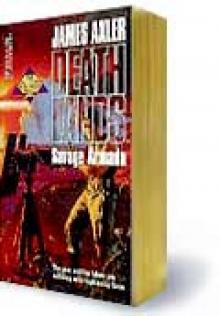 Savage Armada
Savage Armada Desolation Crossing
Desolation Crossing Time Nomads
Time Nomads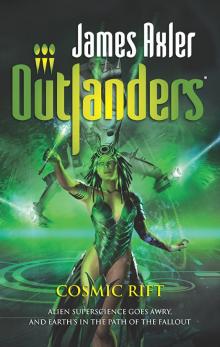 Cosmic Rift
Cosmic Rift Sins of Honor
Sins of Honor Distortion Offensive
Distortion Offensive Arcadian's Asylum
Arcadian's Asylum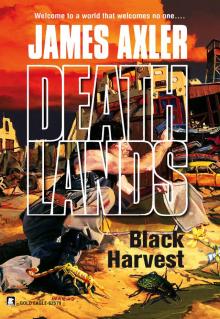 Black Harvest
Black Harvest Iron Rage
Iron Rage Nightmare Passage
Nightmare Passage Labyrinth
Labyrinth Child of Slaughter
Child of Slaughter Cannibal Moon
Cannibal Moon Tainted Cascade
Tainted Cascade Ritual Chill
Ritual Chill Sunchild
Sunchild Wretched Earth
Wretched Earth Northstar Rising d-10
Northstar Rising d-10 Damnation Road Show
Damnation Road Show Hanging Judge
Hanging Judge Dectra Chain d-7
Dectra Chain d-7 Iceblood
Iceblood Deathlands 074: Strontium Swamp
Deathlands 074: Strontium Swamp Angel of Doom
Angel of Doom Sunspot
Sunspot Ice and Fire d-8
Ice and Fire d-8 Pilgrimage to Hell d-1
Pilgrimage to Hell d-1 Wings of Death
Wings of Death Skydark Spawn
Skydark Spawn Neutron Solstice d-3
Neutron Solstice d-3 Deathlands 067: Death Hunt
Deathlands 067: Death Hunt Pilgrimage to Hell
Pilgrimage to Hell Siren Song
Siren Song Perdition Valley
Perdition Valley Dark Fathoms
Dark Fathoms Remember Tomorrow
Remember Tomorrow Crucible of Time
Crucible of Time Savage Armada - Deathlands 53
Savage Armada - Deathlands 53 Judas Strike - Deathlands 54
Judas Strike - Deathlands 54 End Day
End Day Dark Resurrection
Dark Resurrection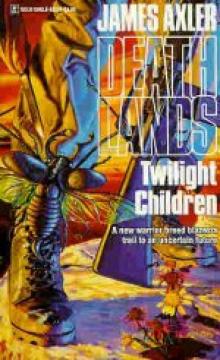 Deathlands - The Twilight Children
Deathlands - The Twilight Children Deathlands 068: Shaking Earth
Deathlands 068: Shaking Earth Breakthrough
Breakthrough Death Hunt
Death Hunt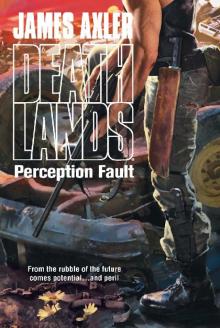 Perception Fault
Perception Fault Red Equinox
Red Equinox Motherlode
Motherlode Deathlands 071: Ritual Chill
Deathlands 071: Ritual Chill Hell Road Warriors
Hell Road Warriors Downrigger Drift
Downrigger Drift Gaia's Demise
Gaia's Demise Hell's Maw
Hell's Maw Devil's Vortex
Devil's Vortex Prodigal's Return
Prodigal's Return Deathlands 122: Forbidden Trespass
Deathlands 122: Forbidden Trespass Scarlet Dream
Scarlet Dream Bloodfire
Bloodfire Plague Lords (Empire of Xibalba, #1)
Plague Lords (Empire of Xibalba, #1)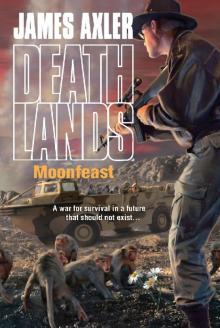 Moonfeast
Moonfeast Latitude Zero
Latitude Zero Lost Gates
Lost Gates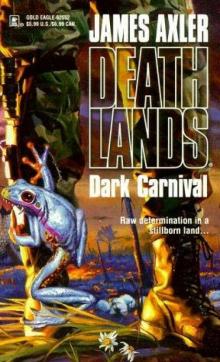 Dark Carnival
Dark Carnival Crimson Waters
Crimson Waters Vengeance Trail
Vengeance Trail Apocalypse Unborn
Apocalypse Unborn Doom Helix
Doom Helix Sorrow Space
Sorrow Space Separation
Separation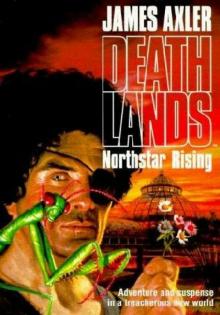 Northstar Rising
Northstar Rising Red Holocaust
Red Holocaust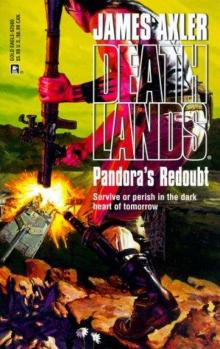 Pandora's Redoubt
Pandora's Redoubt Chill Factor
Chill Factor Prophecy
Prophecy Crater Lake d-4
Crater Lake d-4 Apocalypse Unseen
Apocalypse Unseen Watersleep
Watersleep Judas Strike
Judas Strike Time Castaways
Time Castaways Baptism of Rage
Baptism of Rage Polestar Omega
Polestar Omega Red Holocaust d-2
Red Holocaust d-2 Outlanders 15 - Doom Dynasty
Outlanders 15 - Doom Dynasty Way of the Wolf
Way of the Wolf Deathlands 075: Shatter Zone
Deathlands 075: Shatter Zone Shadow Fortress
Shadow Fortress Outlander 05 - Parallax Red
Outlander 05 - Parallax Red Shaking Earth
Shaking Earth Playfair's Axiom
Playfair's Axiom Truth Engine
Truth Engine Homeward Bound
Homeward Bound Desert Kings
Desert Kings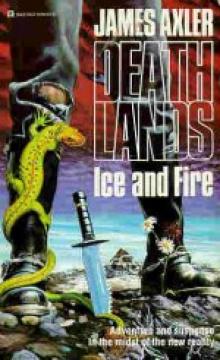 Ice and Fire
Ice and Fire Zero City
Zero City Palaces of Light
Palaces of Light No Man's Land
No Man's Land Neutron Solstice
Neutron Solstice Devil Riders
Devil Riders Thunder Road
Thunder Road Deathlands 118: Blood Red Tide
Deathlands 118: Blood Red Tide Deathlands 114: Siren Song
Deathlands 114: Siren Song Reality Echo
Reality Echo Hive Invasion
Hive Invasion God War
God War Chrono Spasm
Chrono Spasm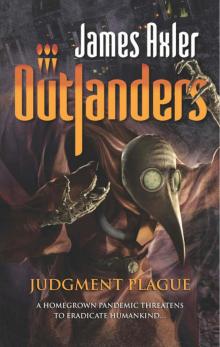 Judgment Plague
Judgment Plague Blood Red Tide
Blood Red Tide Dectra Chain
Dectra Chain Strontium Swamp
Strontium Swamp Seedling
Seedling Shatter Zone
Shatter Zone Hellbenders
Hellbenders